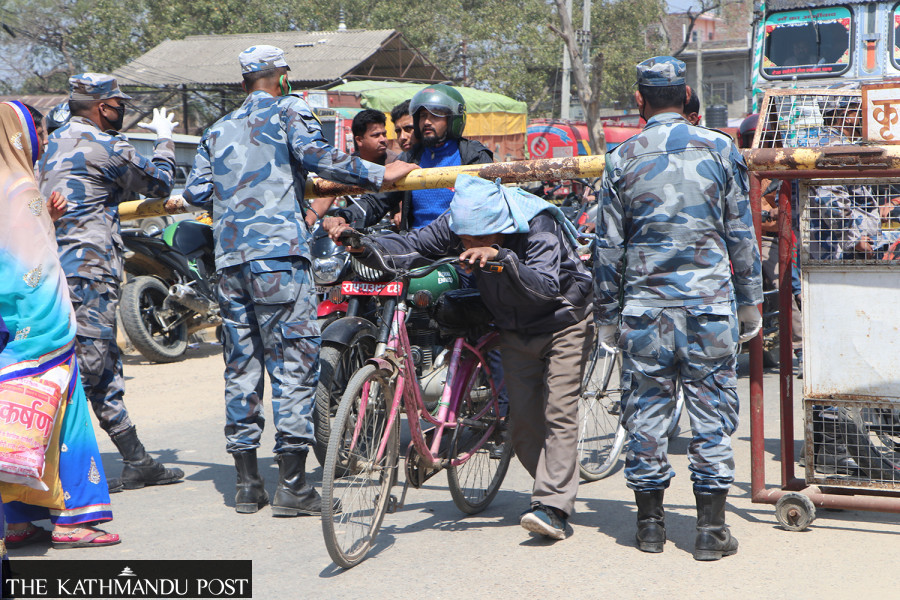National
Lawmakers, experts warn of possible refugee influx from Bangladesh
Despite more security on Nepal-India border, they caution Nepal may struggle to keep out a big mass of refugees.
Anil Giri
As the political turmoil in Bangladesh continues, attacks on Hindu and Buddhist minorities there have entered Nepal’s House of Representatives as a matter of concern.
At least half a dozen lawmakers who spoke at Tuesday’s House meeting asked the government to speak up on the issue.
Security officials warn that if the crisis in Bangladesh gets worse, there could be a huge influx of minorities crossing over to Nepal through India. The Ministry of Home Affairs has accordingly instructed all district administration offices and local security agencies to check illegal crossings.
Experts warn that Nepal may soon face an influx of refugees from Bangladesh if repression against minorities continues there. Despite tight security across the Nepal-India border, they have warned of a strong possibility that Bangladeshi nationals may attempt to flee to Nepal.
On Tuesday, the Armed Police Force and Nepal Police intercepted and sent back a Bangladeshi couple who tried to sneak into the country through the porous Nepal-India border, said DIG Kumar Neupane, who is also the spokesperson of the Armed Police Force.
Neupane said that several Bangladeshis were also stopped at the Jogbani border point as they were trying to cross into Nepal.
Home ministry officials said Nepal’s reputation as a tolerant society makes it an attractive destination for those seeking refuge. They also expressed concerns that, as there is no restriction on Indian nationals to cross over into Nepal, there may be attempts to smuggle Bangladeshi nationals in groups of Indians to evade detection by Nepali security personnel.
“Earlier too we have stopped some Bangladeshi nationals who were trying to sneak into Nepal, although such incidents are few and far between. This time, we have deployed additional security personnel along the Nepal-India border to prevent illegal crossings,” said Neupane.
A senior home ministry official said that the porous Nepal-India border has been a common route for infiltration in past cases involving Bhutanese and Rohingya refugees. “We have learned from these incidents and are now taking ample precautions,” the official said.
Nepali Congress lawmaker Arjun Narasingha KC, speaking in Parliament on Tuesday, said the government should not stay silent on attacks against Hindu and Buddhist minorities in Bangladesh. That the government has not spoken out against the persecution of minorities in the neighbouring country is disappointing, he said.
“The root causes of the coup in Bangladesh were widespread corruption, the rulers’ despotism, arrogance, ego, and a desire for revenge. The incident in Bangladesh has also highlighted how monopolising of resources and their unfair distribution can lead to a country’s instability,” said KC.
CPN-UML lawmaker Kiran Kumar Sah echoed similar sentiments in the House, urging the government to respond to the attacks on Hindu minorities in Bangladesh.
“The government should speak out against these attacks, which are unacceptable,” said Sah, while urging the government to use diplomatic channels to accordingly alert the new Bangladesh government.
How do the Kathmandu-based strategic circles view the recent developments in Bangladesh, and what are the chances of people fleeing repression and entering Nepal?
Akhilesh Upadhyay, senior research fellow at the Institute for Integrated Development Studies and former editor-in-chief of the Post, says it is crucial for political stability to return to Bangladesh as early as possible.
Upadhyay recalled the 1971 Liberation War that led to the creation of Bangladesh, when an estimated 10 million people fled what was then East Pakistan and entered India, mostly to West Bengal and the Indian northeast.
“This was the worst refugee crisis of the second half of the 20th Century. Given that Jhapa district is right next to the Indian Chicken’s Neck [a narrow strip that separates Nepal from Bangladesh], it is unrealistic to think that Bangladesh's problem wouldn’t have a spillover effect on the region, including in Nepal.”
“The security forces can perhaps stop a few thousand refugees on the border, but they can’t stop tens of thousands or millions fleeing unrest at home.”
Mahendra Bahadur Shahi of the CPN (Maoist Centre), Ashim Shah of the Rastriya Swatantra Party, and Rajendra Pandey of the CPN (Unified Socialist), among other lawmakers, warned that Nepal may face a situation similar to Bangladesh if the political leadership fails to effectively address the concerns of youths.
Meanwhile, concern is growing in the security establishment about the possible spillover of the Bangladeshi crisis on some bordering districts of Nepal. On Monday, the District Administration Office, Sunsari, held a meeting with various religious leaders, and emphasised the importance of maintaining social and religious harmony.
All sides agreed to play constructive roles in maintaining religious and social harmony in Sunsari district, said Ram Chandra Tiwari, the chief district officer.
Tiwari noted that Sunsari has in the past witnessed social and religious tensions during various religious ceremonies. “Apart from traditional festivals, no religious gatherings, conferences or events will be permitted without prior approval from the District Administration Office,” said Tiwari.




 16.12°C Kathmandu
16.12°C Kathmandu















